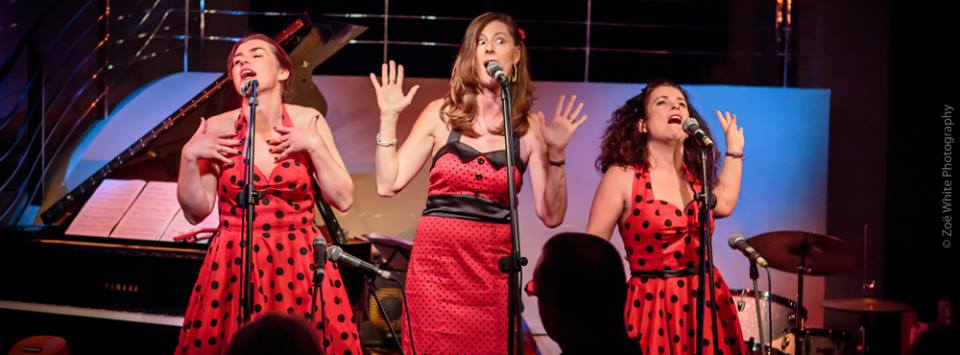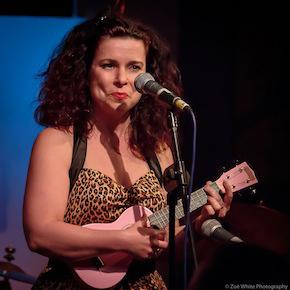
LISA DART – SURVIVAL POETRY AND THE VOICES OF EXPERIENCE
I interviewed Lisa Dart, finalist in the Grolier, Aesthetica and Troubadour Poetry Prizes and author of The Linguistics of Light (poems, Salt, 2008), Fathom (prose


I interviewed musician and former actress and teacher Deirdre O’Kelly about the effects of Long Covid on her life. Deidre trained at RADA, has been teaching singing, drama and musical theatre for 14 years, runs community choirs and performs a cappella with The Decibelles. For Deirdre and others like her, Long Covid has changed everything.
Leslie: Tell us how Covid led to Long Covid and how the experience has changed both what you can do and the person you are.
Deirdre: I got Covid before the vaccines, in October 2020. It was already a difficult time as my dad was dying of cancer. He died ten days after my infection, while I was still isolating (there were strict rules about isolating while positive at that time) and I was the only member of my family who wasn’t able to say goodbye. The experience of losing my health and my dad at the same time led to a deep depression and I had to seek grief counselling a few months later. I never felt that Covid “led to” Long Covid as such; I just never recovered. For months I still had the same symptoms I’d had at the acute stage. I’m fairly certain viral persistence was and is a big factor in my Long Covid, especially given how it presented at first. I was diagnosed a few weeks after infection. I was really struggling to breathe so went in to A&E. They couldn’t find anything wrong with my lungs in an X-Ray, which is pretty common for Long Covid patients, and the doctor suggested Long Covid.
For the first few months I wasn’t able to do much. I mostly stayed in bed or on the sofa. I was able to do some online teaching (five hours a week) and rested immediately before and afterwards. The fact that I’m a singing teacher helped a lot; the singing exercises were great for my breathing and of course the music helped my mental health. It helps everyone’s mental health in my opinion!
How it has changed me is harder to answer. I’ve become much more wary of people in real life. I have much less of a social life. I mostly teach and sing and rest at home. I only work about eight hours a week now. I’m very uncomfortable in crowds, I hate loud noises and bustling, busy environments. I get easily overwhelmed and have to try to protect myself from too much stress, which isn’t easy. The general attitude of society towards people with Long Covid or people who try to avoid Covid has been extremely disheartening, there is so much dismissiveness and even mockery. But the online community helps mitigate that feeling.

Leslie: When you contracted Covid was there an element of ‘unpreparedness’? If so, why do you think that was the case?
Deirdre: I got Covid before there was much awareness about Long Covid, so I was very unprepared for how long the symptoms would last. I’ve seen emails and messages from that time I sent to my students telling them that “hopefully I’ll be back next week and should feel better by then”. How depressing that is to see now. I had no idea! I did wear a mask before I got infected, but just cloth or surgical masks. I don’t remember seeing anything about the quality of masks or respirators at that time. I didn’t realise how little protection my pretty cloth masks were giving me.
Leslie: How did you learn to sing a cappella in a trio? What are the joys and difficulties of singing without instrumental accompaniment?
Deirdre: I’ve been singing since I was a child. My dad was a singer and singing teacher and I grew up singing in the church choir which he led (and which I now lead). Harmony singing was second nature to me; I remember singing the harmony part of “Silent Night” at primary school with a friend singing the tune, and everyone being very impressed, and not understanding why they were impressed! Singing a cappella is fun. I wouldn’t say I prefer it to singing with instruments; in fact my band does both. There are limitations to singing a cappella with so few people which is why we are flexible. But singing three part close harmony does produce a lovely sound when you do it right!
A snippet from our latest arrangement of #Adele's #EasyOnMe 🎶 pic.twitter.com/I6vmsqGlNr
— The Decibelles UK (@decibellesuk) December 10, 2023
Leslie: Tell us about running community choirs. What are the stand-out stories and characters from running those groups?
Deirdre: I love running my community choirs. I have high expectations of them and get them to sing in harmony too. I’ve said to them I don’t want to end up just doing glorified singalongs so we always do at least two part harmony, depending on the number of singers and their ability level. Last week I held a concert including all four of my choirs and it was a great success. We sang Stairway to Heaven and Aquarius/Let the Sunshine In and everyone loved it.
Many of my singers are older people who come because they want to fill their time following a bereavement. One lady told me last year that coming to sing in my choir had changed her life. She’d lost her husband and was at rock bottom, and had been persuaded by her daughters to sign up for one of my classes as she’d always had a nice singing voice. Within a year she’d enrolled for more classes and had completely come out of her shell. She even dressed differently. I honestly hadn’t been aware of this until she told me, but there are many stories like this among my choirs – and countless other choirs too.
Sometimes people find love. I’ve had a few romances begin in my choirs!
Last year a beloved member of my Rock Choir died suddenly, and we were all devastated. We’d been rehearsing a song (You Will Be Found) with him singing one of the solos. The entire choir came to his funeral and sang the song for him and for his family.
In my Rock Choir there is a lovely elderly man with Alzheimers, who comes along with his son. I see the son helping his dad with the words and helping him learn the tune every week, and it is the most perfect example of love in action I’ve seen. And the dad has a terrific voice, a wonderful bass. We really need him! So I’m thankful for them both. The mum has come along to the concerts and has told me what a difference it makes to her husband to be part of the choir. I was glad to be able to tell her what an important asset he is! But of course I’d be happy to have him even if he couldn’t sing much. None of my choirs are audition based and everyone is welcome. And I never, ever tell my singers to mime or sing more quietly, even the ones with less tuneful voices! Too many of them tell me that story from their schooldays, and it affected their confidence for many years.
There are so many stories like this. It’s a real snapshot of ordinary life. My choirs are full of lovely people with their own troubles and sadnesses, with one thing in common: we know how much music makes our lives better.

Leslie: You have been a busy-busy community activist and a person experiencing a disabling condition. What’s your takeaway on these two extremes? How well do we support illness and exclusion in our society (and prepare our children to both ‘do’ and ‘be’)?
Deirdre: I have found a lot of solace in the Long Covid and Covid aware community. It’s been a very strange few years, with the world going from total (understandable) panic about the pandemic in 2020 and 2021 to mostly carrying on as if it had never happened in 2024, or at least behaving as if it was over. I feel that making my voice heard online helps to an extent: the more of us who keep spreading awareness, the better.
However, having Long Covid is very tiring. I’ve been an activist before and spent time on marches and going to rallies etc. But most people with Long Covid don’t have the energy for that, so for me at least, the only activism I can do is virtual. We need able bodied allies to step up and help us. I’ve been disappointed at how quickly the world has moved on and forgotten us, and it’s been an eye opener seeing how disabled people are marginalised in society. I don’t think we’re preparing our kids very well. There is huge pressure around school attendance at all costs, leading to sick kids being sent into school and spreading Covid and other sicknesses. We need to change this attitude and teach kids that their value isn’t only based on how often they turn up to school, or even how many high grades they get. We all need to do better, be more inclusive of difference and disability, in people of all ages.
Next week I interview poet Sarah Corbett, artistic director of the Sylvia Plath Festival.
ABOUT LESLIE TATE’S BOOKS:

I interviewed Lisa Dart, finalist in the Grolier, Aesthetica and Troubadour Poetry Prizes and author of The Linguistics of Light (poems, Salt, 2008), Fathom (prose

I interviewed writer Julia Lee Barclay-Morton about her experience of autism. Julia began as an experimental dramatist in New York, moving to the UK to

I interviewed Gillean McDougall from Glasgow, who edited the collaborative projects Honest Error (on Charles Rennie Mackintosh and his wife Margaret Macdonald) and Writing the

I interviewed French writer Delphine de Vigan, whose book, No et moi, won the prestigious Prix des libraires. Other books of hers have won a clutch

I interviewed Joanne Limburg whose poetry collection Feminismo was shortlisted for the Forward Prize for Best First Collection; another collection, Paraphernalia, was a Poetry Book Society Recommendation. Joanne
| Cookie | Duration | Description |
|---|---|---|
| cookielawinfo-checkbox-analytics | 11 months | This cookie is set by GDPR Cookie Consent plugin. The cookie is used to store the user consent for the cookies in the category "Analytics". |
| cookielawinfo-checkbox-functional | 11 months | The cookie is set by GDPR cookie consent to record the user consent for the cookies in the category "Functional". |
| cookielawinfo-checkbox-necessary | 11 months | This cookie is set by GDPR Cookie Consent plugin. The cookies is used to store the user consent for the cookies in the category "Necessary". |
| cookielawinfo-checkbox-others | 11 months | This cookie is set by GDPR Cookie Consent plugin. The cookie is used to store the user consent for the cookies in the category "Other. |
| cookielawinfo-checkbox-performance | 11 months | This cookie is set by GDPR Cookie Consent plugin. The cookie is used to store the user consent for the cookies in the category "Performance". |
| viewed_cookie_policy | 11 months | The cookie is set by the GDPR Cookie Consent plugin and is used to store whether or not user has consented to the use of cookies. It does not store any personal data. |